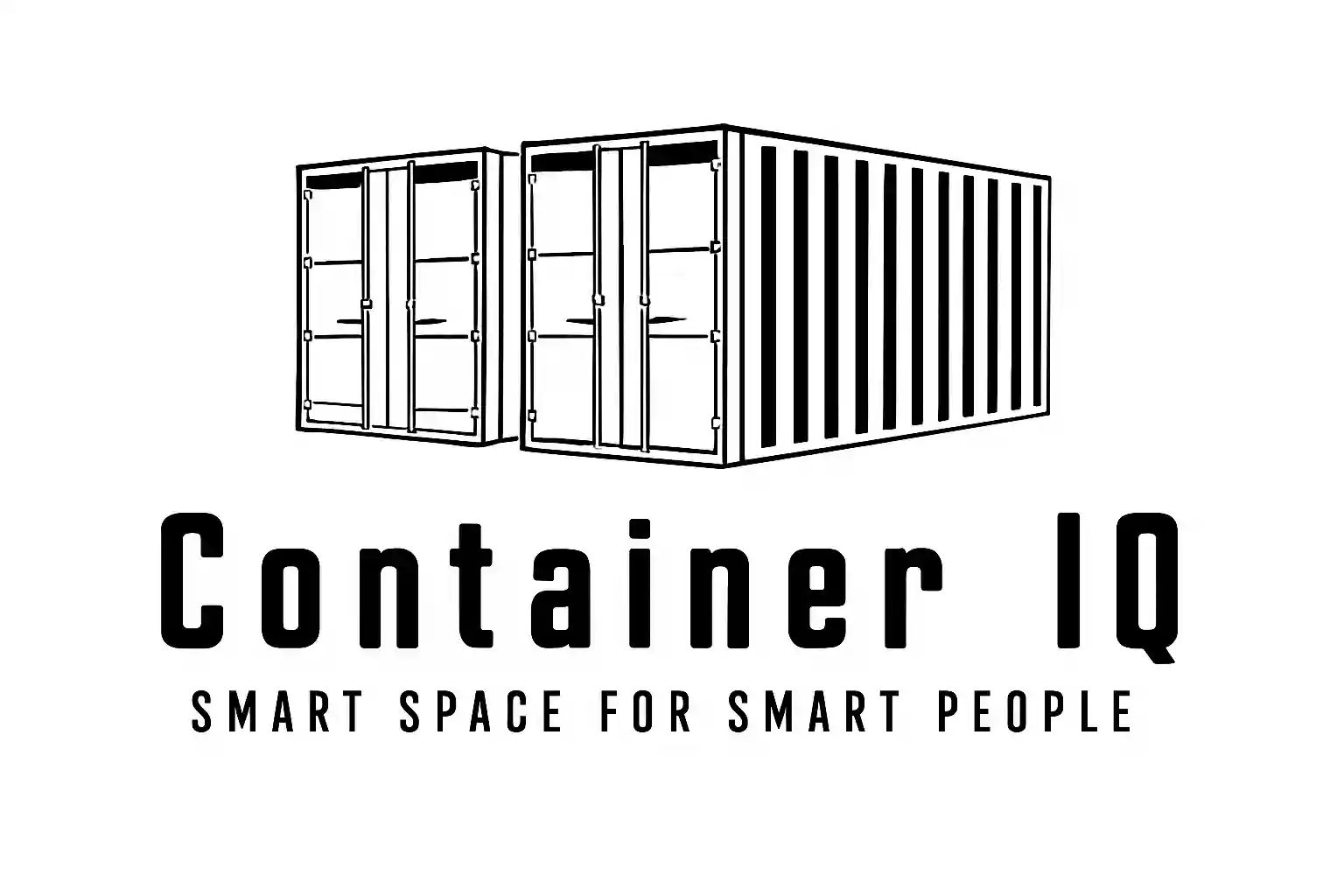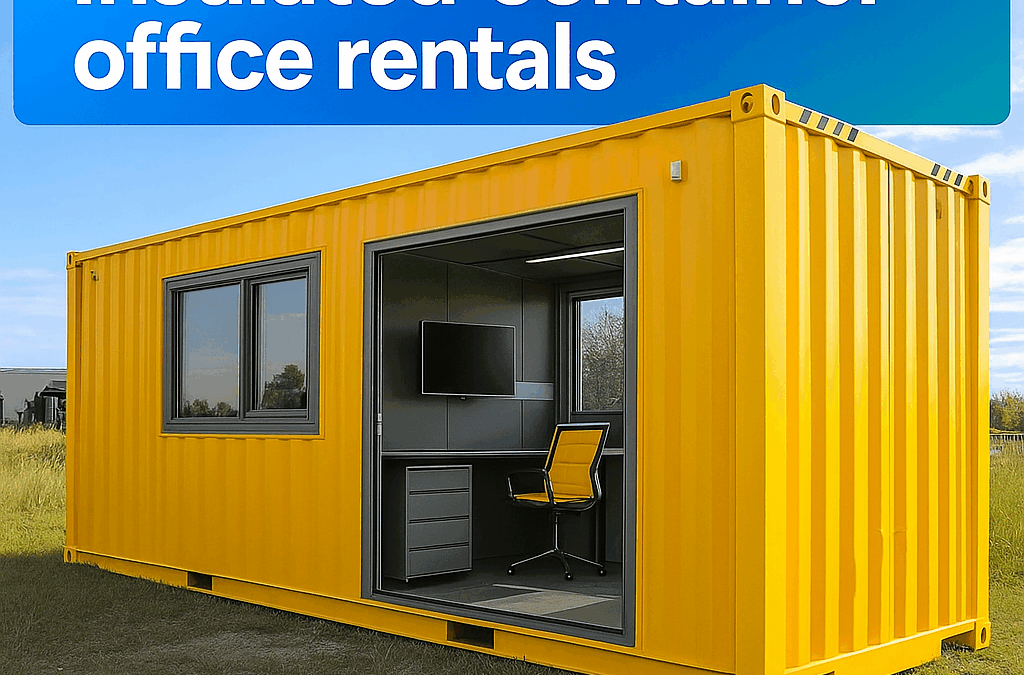Whether you’re managing a construction project, expanding your business operations, or need temporary office space during renovations, finding the right solution can be challenging. Enter insulated container office rentals—a innovative, practical, and cost-effective alternative to traditional temporary offices that’s transforming how businesses approach their space needs.
These aren’t the basic shipping containers of yesterday. Modern insulated container offices offer climate-controlled, comfortable, and professional workspaces that can be delivered to virtually any location. They combine the durability and portability of shipping containers with the comfort and functionality of traditional offices, creating versatile spaces that meet the demands of various industries and applications.
This comprehensive guide will explore everything you need to know about insulated container office rentals, from their numerous advantages and key features to the rental process and ideal use cases. By the end, you’ll understand why these innovative spaces are becoming the go-to choice for businesses seeking flexible, efficient, and comfortable workspace solutions.
Understanding Insulated Container Offices
What Are Insulated Container Offices?
Insulated container offices are modified shipping containers specifically designed to serve as functional, comfortable workspaces. Unlike standard storage containers, these units undergo extensive modifications to make them suitable for human occupancy and professional use.
The transformation process typically includes:
- Thorough cleaning and preparation
- Application of protective coatings
- Installation of insulation throughout walls, ceiling, and floor
- Framing of interior walls
- Electrical and data wiring
- HVAC system installation
- Interior finishing with walls, flooring, and ceilings
- Installation of windows, doors, and security features
The Insulation Advantage
The insulation component is what sets these containers apart from basic site offices. High-quality insulation—typically spray foam or panel insulation—provides numerous benefits:
Temperature Regulation: Proper insulation maintains consistent temperatures regardless of external conditions, keeping the space cool in summer and warm in winter.
Condensation Prevention: Insulation creates a vapor barrier that prevents moisture buildup, protecting both the structure and its contents from mold and water damage.
Acoustic Benefits: Insulation dampens external noise, creating a quieter, more productive work environment.
Energy Efficiency: Well-insulated spaces require less energy to heat and cool, reducing operational costs and environmental impact.
Key Benefits of Renting Insulated Container Offices
1. Superior Climate Control and Comfort
The most significant advantage of insulated container offices is their ability to maintain a comfortable working environment year-round. Unlike uninsulated alternatives that can become unbearably hot in summer and frigid in winter, insulated units provide:
- Consistent temperatures regardless of external weather conditions
- Effective humidity control
- Protection against extreme temperature fluctuations
- Comfortable working conditions that boost productivity and morale
2. Cost-Effectiveness
- Renting an insulated container office offers substantial financial advantages over traditional construction or leasing permanent space:
- Lower Upfront Costs: No large capital investment required compared to building permanent structures.
- Predictable Expenses: Fixed monthly rental costs make budgeting easier.
- No Long-Term Commitment: Flexible rental terms allow you to pay for space only when you need it.
- Reduced Utility Costs: Energy-efficient insulation lowers heating and cooling expenses.
- Minimal Maintenance: The rental company typically handles repairs and maintenance.
3. Rapid Deployment and Flexibility
Time is often a critical factor in business operations, and insulated container offices excel in this area:
Quick Installation: Units can often be delivered and set up within days rather than the weeks or months required for traditional construction.
Easy Relocation: If your needs change, the office can be moved to a new location with minimal disruption.
Scalability: You can easily add or remove units as your space requirements evolve.
Versatile Placement: These offices can be installed on virtually any level surface, including gravel pads, concrete slabs, or temporary foundations.
4. Durability and Security
Built from corrosion-resistant Corten steel, shipping containers are inherently durable and secure:
Weather Resistance: Designed to withstand harsh marine environments, making them suitable for virtually any climate.
Structural Integrity: Strong enough to be stacked multiple units high when properly engineered.
Security Features: Can be equipped with high-security locking systems, alarm systems, and reinforced doors and windows.
Long Lifespan: With proper maintenance, container offices can last for decades.
5. Sustainability
Choosing insulated container offices supports environmental sustainability in several ways:
Reuse of Existing Materials: Repurposing shipping containers gives new life to structures that might otherwise sit idle.
Reduced Construction Waste: Factory modification generates less waste than traditional construction.
Energy Efficiency: Proper insulation reduces energy consumption for heating and cooling.
Recyclability: Steel containers are ultimately recyclable at the end of their lifespan.
Key Features to Look for in Rental Units
When evaluating insulated container office rentals, consider these essential features:
insulation Quality and Type
The effectiveness of the insulation directly impacts comfort and energy efficiency. Look for:
Spray Foam Insulation: Offers excellent thermal performance and creates an effective moisture barrier.
R-Value: Higher R-values indicate better insulating performance. Aim for at least R-15 to R-20 for walls and higher for ceilings.
Complete Coverage: Insulation should cover all surfaces—walls, ceiling, and floor.
Climate Control Systems
A reliable HVAC system is crucial for maintaining comfort:
Properly Sized Unit: The system should be appropriately sized for the space to ensure efficient operation.
Energy-Efficient Models: Look for ENERGY STAR-rated systems to minimize operating costs.
Zoning Capabilities: Larger units may benefit from zoned temperature control.
Thermostat Controls: Programmable thermostats help optimize energy use.
Interior Layout and Amenities
Consider how the interior space is configured:
Workstation Options: Built-in desks or flexible layouts to accommodate your team.
Storage Solutions: Cabinets, shelves, and filing systems to keep the space organized.
Lighting: Energy-efficient LED lighting with both overhead and task lighting options.
Windows: Ample natural light and emergency egress windows for safety.
Flooring: Durable, easy-to-clean surfaces suitable for high traffic.
Electrical and Data Infrastructure
Modern offices require robust connectivity:
Adequate Power: Sufficient outlets and circuit capacity for your equipment.
Data Ready: Pre-installed conduits and data ports for internet and phone systems.
UPS Compatibility: Provisions for uninterrupted power supply systems if needed.
Exterior Connections: Properly rated inlets for generator connection when main power isn’t available.
Exterior Features
Don’t overlook exterior considerations:
Accessibility Features: Ramps, handrails, and ADA-compliant doors if needed.
Weather Protection: Overhangs or awnings to protect entrances.
Security Lighting: Motion-activated lights for safety and security.
Custom Branding: Options for adding your company logo or colors.
Ideal Applications and Use Cases
Insulated container offices serve numerous industries and purposes:
Construction and Infrastructure Projects
Site management offices
Contractor meeting spaces
Safety briefing rooms
Quality control offices
Client presentation areas
Educational Institutions
Temporary classrooms during renovations
Overflow space during enrollment fluctuations
Specialized labs or studios
Administrative offices during construction
Corporate and Commercial Use
Temporary expansion space
Remote project offices
Seasonal operations centers
Branch offices in new markets
Training facilities
Healthcare and Emergency Services
Mobile clinics
Disaster response offices
Temporary triage centers
Vaccination sites
Government and Municipal Use
Election polling stations
Disaster recovery centers
Park ranger stations
Temporary service centers during renovations
Events and Entertainment
Production offices for film sets
Festival command centers
Sporting event management offices
Concert production offices
The Rental Process: What to Expect
Step 1: Needs Assessment
Begin by evaluating your specific requirements:
Number of occupants
Space layout needs
Electrical and technology requirements
Duration of rental needed
Site conditions and access
Budget constraints
Step 2: Research and Quotations
Contact reputable providers and request detailed quotations that include:
All rental fees
Delivery and installation costs
Utility connection requirements
Any additional services needed
Terms and conditions of the rental agreement
Step 3: Site Preparation
Prepare your site for delivery:
Level, stable foundation (gravel pad, concrete slab, or piers)
Clear access route for delivery truck
Marked utilities if present
Prepared power connection point
Step 4: Delivery and Installation
The provider will:
Transport the unit to your site
Position it using a truck-mounted winch or crane
Level and stabilize the unit
Connect to utilities if included in service
Step 5: Use and Maintenance
During the rental period:
Follow all usage guidelines provided
Perform basic maintenance as instructed
Report any issues promptly to the rental company
Keep records of any communications regarding the unit
Step 6: End of Rental
When your rental period concludes:
Schedule pickup with the provider
Remove all personal belongings and clean the interior
Ensure the site is accessible for removal
Complete any required paperwork
Cost Considerations and Budgeting
Understanding the costs involved helps with planning and decision-making:
Rental Rates
Monthly rental rates typically range from $800 to $2,500+ depending on:
Size of the unit (20ft vs. 40ft)
Level of finish and amenities
Geographic location
Rental duration (longer terms often have lower monthly rates)
Market demand
Additional Costs to Consider
Delivery and pickup fees (based on distance)
Site preparation expenses
Utility connection costs
Permits if required by local authorities
Insurance for contents and liability
Additional services like cleaning or maintenance
Cost Comparison with Alternatives
Compared to traditional options, insulated container offices often provide significant savings:
Vs. Construction: Avoids high upfront costs and lengthy timelines
Vs. Traditional Leasing: No long-term commitment or build-out costs
Vs. Uninsulated Trailers: Lower energy costs and better comfort justify slightly higher rental rates
Tips for Maximizing Your Rental Experience
Choose the Right Size
20ft units: Suitable for 2-4 person offices or individual use
40ft units: Ideal for 6-8 person offices or spaces needing meeting areas
Multiple units: Can be combined for larger needs
Plan for Technology Needs
Ensure adequate power capacity for all equipment
Consider data connectivity options before delivery
Plan workstation layouts around power and data ports
Optimize Climate Control
Use programmable thermostats to reduce energy use during off-hours
Keep doors and windows closed to maintain temperature
Use window coverings to manage solar heat gain
Maintain Good Ventilation
Run HVAC fans periodically to circulate air
Don’t block ventilation grilles with furniture or equipment
Consider adding air purifiers for improved indoor air quality
Implement Smart Security Practices
Use all provided security features
Establish key control procedures if multiple people access the space
Consider additional security cameras or alarms if needed
The Smart Choice for Modern Workspace Needs
Insulated container office rentals represent a perfect solution for today’s dynamic business environment. They offer an unmatched combination of comfort, flexibility, durability, and cost-effectiveness that traditional temporary space options simply can’t match.
Whether you need space for a few months or several years, these versatile units provide a professional, comfortable working environment that supports productivity and well-being. The insulation factor is particularly valuable, ensuring that your team can work efficiently regardless of external weather conditions while keeping energy costs manageable.
As businesses continue to seek agile, efficient solutions for their space needs, insulated container offices stand out as a smart, sustainable choice that meets the challenges of modern work while providing exceptional value. By understanding the benefits, features, and rental process outlined in this guide, you’re well-equipped to make an informed decision that will serve your business needs now and in the future.
Ready to explore insulated container office rentals for your business? Contact a reputable provider today to discuss your specific needs and discover how these innovative spaces can transform your operations.
if you have any questions or queries, feel free to contact us for more information, or request a free quotation

